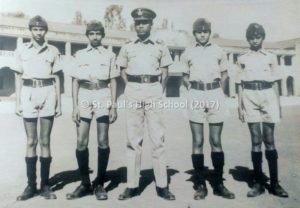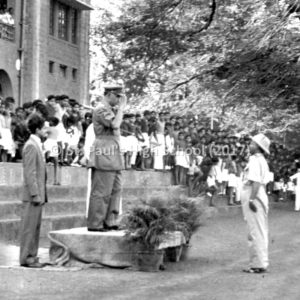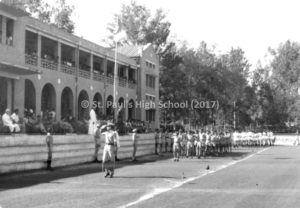After the inauguration of NCC in India on 15th July 1948, a large number of school students wanted to join the Junior Division and as the government financial resources (available then) were not sufficient, a supplement to the Junior Division of the NCC was formed in 1952. This was called the Auxiliary Cadet Corps (ACC) and had the motto: “Service to the country”. The per capita expenditure on an ACC Cadet was much less than for a NCC Cadet. This allowed for a greater number of students to join from across the country.
Even at St. Paul’s we see an early reference to the ACC in the school annual of Summer 1959. It mentions that for two consecutive years, the ACC group of the school won the best “ACC Group Prize” in Belgaum. This also goes to show that the ACC run in St. Paul’s from around 1957 or probably even before that.
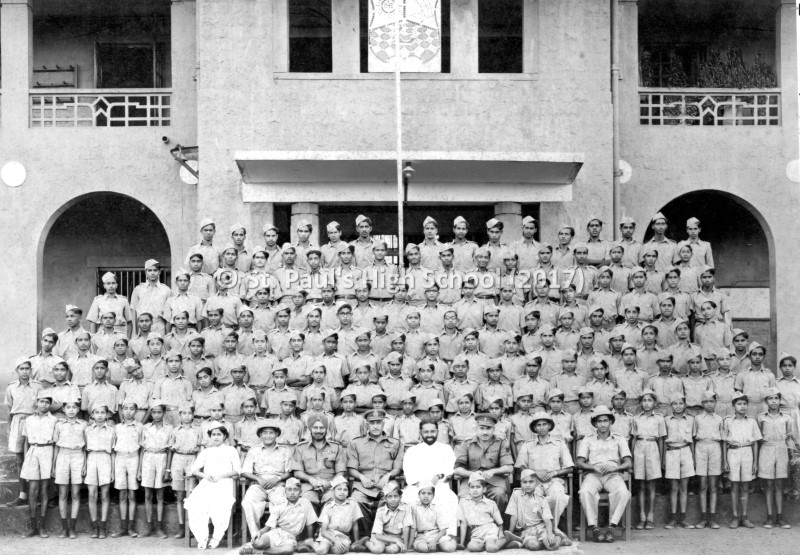
After the Chinese aggression in 1962, the Ministry of Defence, agreeing with the recommendations of the ‘Inter–University Board’, made NCC compulsory, in all colleges. At the same time, the ACC, Auxiliary Cadet Corps was merged with the NCC. This was probably also the birth of the NCC at St. Paul’s
Over years, there have been different staff members in-charge of the ACC and later, the NCC at St. Paul’s; and it is because of their selfless service that St. Paul’s has time and again won many awards.
The many NCC Officers at St. Paul’s have ensured that the school chapter lives up to the name of the glorious institution that it is, and this can be clearly seen by the number of NCC achievers at the national level, where St. Paul’s features among the top few institutions. To top it all, in the years 2014-2015 and 2016-2017, St. Paul’s has been selected as the “Best Institution – Junior Division (Boys) – Karnataka and Goa Directorate”.
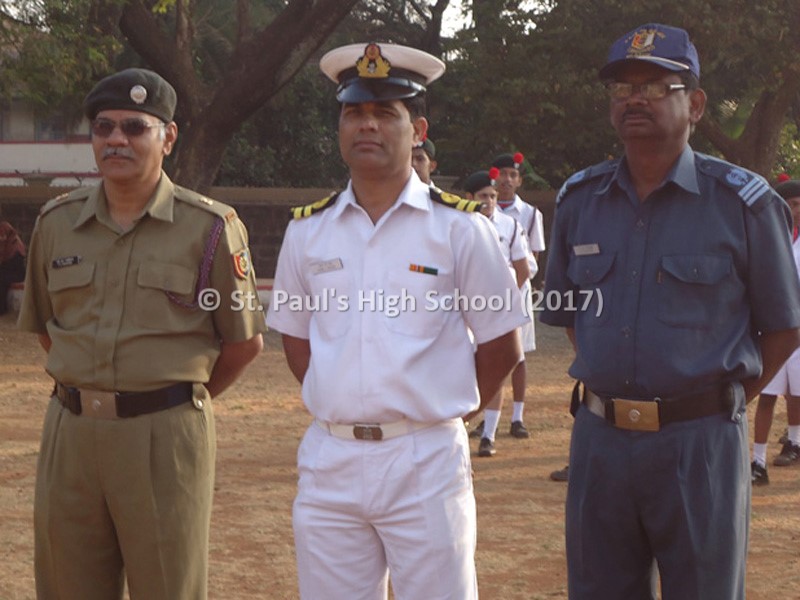
Army Wing
Troop Commander: Mr. V. N. Parvatikar
Duration: 2 Years
Age Group: 13-15 Years (Std VIII and IX)
Certification: “A” Certificate
The school NCC Army Wing troop is led by Troop Commander Mr. V. N. Parvatikar. He is a thorough disciplinarian, and tests the boys to their greatest endurance levels. Cadets attend parades, often twice a week, sometimes in the presence of Army Wing Officers.
The aim of the army wing is to achieve unity and discipline in its tasks. The Cadets are exposed to a variety of activities in the two years of training, which include – Gun Firing, Map-Reading, Battle-Craft etc. Cadets of second year are given an opportunity to acquaint of military life.
There are three levels of Camps organized for the Cadets – BLC (Basic Leadership Camp), TSC (Thal Sainik Camp), RDC (Republic Day Camp). The boys train for the entire year to get into the Republic Day Camp, which gives them an opportunity to attend the Annual Republic Day Parade at New Delhi. Selections for this Camp are done on the basis of Marching skills, Height, Cultural events and general knowledge. Till date, many Cadets from St. Paul’s have attended the RD Camp and have also been awarded with high honours.
At the end of their training, the Cadets have to attend a written examination, passing which, they secure the “A certificate”. All the cadets of St. Paul’s pass the exam with flying colours.
Air Wing
Troop Commander: Mr. Savio Martin
Duration: 2 Years
Age Group: 13-15 Years (Std VIII and IX)
Certification: “A” Certificate
The school NCC Air Wing troop is led by Troop Commander Mr. Savio Martin, who takes a keen interest educating the Cadets about the Indian Air Force and gives them great training. The Cadets generally attend parades twice a week and often, the Air Wing Officers visit to train them.
The boys are always encouraged to take part in all the rallies and events that take place state-wide. There are different Camps like ATC – II, Trekking camp, National camps, and there is also the Annual Camp, where the Cadets are taught about discipline, punctuality, aeromodelling, aerodynamics, shooting, etc. The Air Wing however, emphasizes on training in the field of aircrafts, and thus the Cadets are taught about the parts of an aircraft i.e., the fuselage, fins, main plane, tail plane, under carriage, cockpit, the engine, radiator, radar, rudder, ammunitions, etc.
Many times, the Camps are held at the Air force station, situated at Sambra. Sometimes, the lucky Cadets also get an opportunity to fly a microlite with their Commanding Officer.
At the end of their training, the Cadets have to attend a written examination, passing which, they secure the “A certificate”. All the cadets of St. Paul’s pass the exam with flying colours.
Navy Wing
Troop Commander: Mr. Karu Wagh
Duration: 2 Years
Age Group: 13-15 Years (Std VIII and IX)
Certification: “A” Certificate
The school NCC Navy Wing troop is led by Troop Commander Mr. Karu Wagh. He has been training Cadets about the importance of Naval Troops for many years. Marching Parades are organized and attended by the Cadets twice a week, often in the presence of Navy Wing Officers.
The boys actively participate in Camps and outings across the state, and bag many prizes. General concepts of the training include discipline, punctuality, marching and shooting. However, there is special emphasis laid upon the field of naval troops, and hence the Cadets are taught about the parts of an navy vessels such as the INS Vikrant etc.
Many State Camps are held at the Karwar Naval Base. Our students have been actively involved in the state level camps, and many of the boys continue their NCC higher level certification even in college.
At the end of their training, the Cadets have to attend a written examination, passing which, they secure the “A certificate”. All the cadets of St. Paul’s pass the exam with flying colours.
Some glimpses from the early days of NCC at St. Pauls | The center picture is of General Thimmayya G.O.C. Southern Command takes the salute from Fr. V. D’Cunha S.J. o/c ACC (Senior troop) at St. Paul’s.
Click here to see the NCC Roll of Honour.
Further Reading
Parts of the content on this page have been taken from the following external links, and we are grateful for the content.
- The National Cadet Corps Official Website
https://indiancc.nic.in/ - The National Cadet Corps Karnataka Official Website
http://www.karnataka.gov.in/ncckarnataka/Pages/default.aspx - The National Cadet Corps Wikipedia Site
https://en.wikipedia.org/wiki/National_Cadet_Corps_(India)

